
The wind’s touch was cold. It fingered his cloak, lifting the edges, finding the fissures between folds of the wool. He shivered, but he did not move to pull the mantle further about him.
He must not move.
He must not be seen, hiding there among the reeds.
It was full dark, a crescent moon had long gone, faded beyond a misted horizon. And yet the air was silvered as if a starlit frost brightened the air.
Then they were there; voices, many voices.
Eochaid’s steward froze into shadow.
He must not move.
He must not be seen.
He, Rechtaire, had been present when his king, when Eochaid, had won the fidchell game. He had seen Midir’s face when he had accepted the outrageous stake, to take upon himself four tasks:
The removing of stones from the plain of Meath
Rushes over Tethba, a wood over Bréifne
The creation of a causeway on Móin Lámraige.
A causeway over Móin Lámraige; it was this task that Midir feared. The steward knew it, had seen it clearly. Oh, Midir had stood there, untroubled, as fine and fair a man as ever, but Rechtaire was a steward, ever ready to meet the needs of a Lord. He could read a man at will, and he had read Midir in that moment, had seen the sag of his shoulders, had noticed the grim set of his mouth. Midir had accepted the task, but asked that no-one should witness the work, demanded that all should stay inside while the labour lasted, the causeway constructed. Eochaid had agreed, but had secretly sent his own steward to wait and watch, watch and wait.
So here he was, and here was Midir on the marshy plain of Móin Lámraige, but he was not alone.
There were voices, many voices, and the lowing groaning of huge and heavy oxen. It seemed to him, as he hid among the tall reeds, as though all the men in the world had come to the boggy plain.
The light was growing, glowing. It seemed to arise like a mist from the men themselves. He could see clearly now. There was Midir in his purple tunic, his yellow hair to the edge of his shoulder. He watched as Midir’s people readied themselves for work, stripping off their fine tunics and making them into a shimmering mound at Midir’s feet.
And then the great work began. It seemed it was an entire forest that the great oxen hauled into that bog. Tree followed tree. Birch after birch, oak after oak, was chopped and shaped into pole and plank. Man and beast, muscles straining to the snapping point, drew them, dragged them into place, sliding painfully on the slippery edges. It made a mighty tumult indeed.
Rechtaire watched in wonder, awed by the power of the beautiful beasts, with the strength and skill of the men, as they laid the rails and the great oaken lathes. He noted carefully the way the oxen were yoked at the neck, rather than at the forehead – so much better than the usual custom of his people. This he would remember. He admired the speed and deftness with which they packed the wooden causeway with clay and gravel, making it stable.
Yet even as he watched the road take shape, the dreadful din of the work seemed to alter, and within the maelstrom of discord, he began to hear chanted words, holding man and beast together. He listened and the song became clearer. Rechtaire knew that the words were the road itself, a work-song of shaping.
We have set our hands to this task
Hold hard
If we have taken from the cauldron greater than we can grasp
Hold hard
If we are at fault, then the fault will not be ours
Hold hard
As the muscle-rippled oxen hold hard, so will we
Though the burden of payment is heavy, we have set our hand on this bride-price road
Whether it is that we gain or we lose.
And in the silver mist chant, the road grew longer, stronger. This, the steward knew, was a work of great magic, a secret sight he might never again glimpse. Yet, even as he strained to hear the song more clearly, to see the road take shape before his eyes, it came to him that there was another song, an undercurrent in the river-flow of the chanted sounds. And there were darker words, crimson-stained.
Lay the wood to the ground
Lay it down
Though the hands of the host be raw and red
Lay it down
Though we groan under this bloody stake
We lay the wood down
Our feet dragging in the bog
Our craftsmen heavy-limbed, stumbling in the rush-rimmed mud
Shielding hands as they struggle
We lay the wood down
It is a heavy price to pay for a single woman
It is a crooked bridge to cross, this hardship
Even for one of our own
For that woman has chosen a king who sleeps
Whose eyes are shut to an ending in slaughter
And for whom we build in uncertain times
As he builds for himself only sadness.
Rushes over Tethba, stones from Meath, trees over Breifne
What will be gained, what lost?
The steward stood up, staring into the darkness and now he understood. He saw no uncanny host, hands set to a magical task. Here was a company, work-worn and wearied almost to death, with a burdensome task which would, at the last, be flawed and lost to time.
His standing was heard by Midir, who turned and silently regarded the steward. For a long moment they stared at each other, and Rechtaire knew that, from now on, the two peoples might be allies or enemies; but that their worlds would never again converge.

1 thought on “A Causeway Over Móin Lámraige”